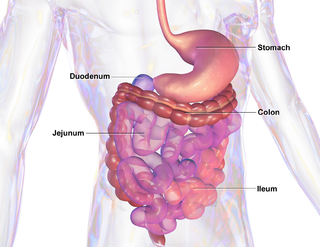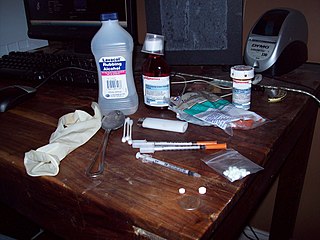Related Research Articles

Hygiene is a set of practices performed to preserve health. According to the World Health Organization (WHO), "Hygiene refers to conditions and practices that help to maintain health and prevent the spread of diseases." Personal hygiene refers to maintaining the body's cleanliness. Hygiene activities can be grouped into the following: home and everyday hygiene, personal hygiene, medical hygiene, sleep hygiene, and food hygiene. Home and every day hygiene includes hand washing, respiratory hygiene, food hygiene at home, hygiene in the kitchen, hygiene in the bathroom, laundry hygiene,and medical hygiene at home.And also environmental hygiene in the society to prevent all kinds of bacterias from penetrating into our homes.

An intestinal parasite infection is a condition in which a parasite infects the gastro-intestinal tract of humans and other animals. Such parasites can live anywhere in the body, but most prefer the intestinal wall.

A blood-borne disease is a disease that can be spread through contamination by blood and other body fluids. Blood can contain pathogens of various types, chief among which are microorganisms, like bacteria and parasites, and non-living infectious agents such as viruses. Three blood-borne pathogens in particular, all viruses, are cited as of primary concern to health workers by the CDC-NIOSH: HIV, hepatitis B (HVB), & hepatitis C (HVC).

Hand washing, also known as hand hygiene, is the act of cleaning one's hands with soap or handwash and water to remove viruses/bacteria/microorganisms, dirt, grease, and other harmful or unwanted substances stuck to the hands. Drying of the washed hands is part of the process as wet and moist hands are more easily recontaminated. If soap and water are unavailable, hand sanitizer that is at least 60% (v/v) alcohol in water can be used as long as hands are not visibly excessively dirty or greasy. Hand hygiene is central to preventing the spread of infectious diseases in home and everyday life settings.

Klebsiella pneumoniae is a Gram-negative, non-motile, encapsulated, lactose-fermenting, facultative anaerobic, rod-shaped bacterium. It appears as a mucoid lactose fermenter on MacConkey agar.

A hospital-acquired infection, also known as a nosocomial infection, is an infection that is acquired in a hospital or other healthcare facility. To emphasize both hospital and nonhospital settings, it is sometimes instead called a healthcare-associated infection. Such an infection can be acquired in a hospital, nursing home, rehabilitation facility, outpatient clinic, diagnostic laboratory or other clinical settings. A number of dynamic processes can bring contamination into operating rooms and other areas within nosocomial settings. Infection is spread to the susceptible patient in the clinical setting by various means. Healthcare staff also spread infection, in addition to contaminated equipment, bed linens, or air droplets. The infection can originate from the outside environment, another infected patient, staff that may be infected, or in some cases, the source of the infection cannot be determined. In some cases the microorganism originates from the patient's own skin microbiota, becoming opportunistic after surgery or other procedures that compromise the protective skin barrier. Though the patient may have contracted the infection from their own skin, the infection is still considered nosocomial since it develops in the health care setting. Nosocomial infection tends to lack evidence that it was present when the patient entered the healthcare setting, thus meaning it was acquired post-admission.
The Joint Commission is a United States-based nonprofit tax-exempt 501(c) organization that accredits more than 22,000 US health care organizations and programs. The international branch accredits medical services from around the world.

NYC Health + Hospitals, officially the New York City Health and Hospitals Corporation (HHC), operates the public hospitals and clinics in New York City as a public benefit corporation.
Infection prevention and control is the discipline concerned with preventing healthcare-associated infections; a practical rather than academic sub-discipline of epidemiology. In Northern Europe, infection prevention and control is expanded from healthcare into a component in public health, known as "infection protection". It is an essential part of the infrastructure of health care. Infection control and hospital epidemiology are akin to public health practice, practiced within the confines of a particular health-care delivery system rather than directed at society as a whole.
Patient safety is a discipline that emphasizes safety in health care through the prevention, reduction, reporting and analysis of error and other types of unnecessary harm that often lead to adverse patient events. The frequency and magnitude of avoidable adverse events, often known as patient safety incidents, experienced by patients was not well known until the 1990s, when multiple countries reported significant numbers of patients harmed and killed by medical errors. Recognizing that healthcare errors impact 1 in every 10 patients around the world, the World Health Organization (WHO) calls patient safety an endemic concern. Indeed, patient safety has emerged as a distinct healthcare discipline supported by an immature yet developing scientific framework. There is a significant transdisciplinary body of theoretical and research literature that informs the science of patient safety with mobile health apps being a growing area of research.
A patient safety organization (PSO) is a group, institution, or association that improves medical care by reducing medical errors. Common functions of patient safety organizations are data collection, analysis, reporting, education, funding, and advocacy. A PSO differs from a Federally designed Patient Safety Organization (PSO), which provides health care providers in the U.S. privilege and confidentiality protections for efforts to improve patient safety and the quality of patient care delivery
The American Sexual Health Association (ASHA), formally known as the American Social Hygiene Association and the American Social Health Association, is an American nonprofit organization established in 1914, that cites a mission to improve the health of individuals, families, and communities, with an emphasis on sexual health, as well as a focus on preventing sexually transmitted infections and their harmful consequences. ASHA uses tools such as education, communication, advocacy and policy analysis activities with the intent to heighten public, patient, provider, policymaker and media awareness of STI prevention, screening, diagnosis and treatment strategies.

Peter J. Pronovost is Chief Quality and Transformation Officer at University Hospitals Cleveland Medical Center, the main affiliate of the Case Western Reserve University School of Medicine.

In health care facilities, isolation represents one of several measures that can be taken to implement in infection control: the prevention of communicable diseases from being transmitted from a patient to other patients, health care workers, and visitors, or from outsiders to a particular patient. Various forms of isolation exist, in some of which contact procedures are modified, and others in which the patient is kept away from all other people. In a system devised, and periodically revised, by the U.S. Centers for Disease Control and Prevention (CDC), various levels of patient isolation comprise application of one or more formally described "precaution".

Global Hand washing Day (GHD) is an international hand washing promotion campaign to motivate and mobilize people around the world to improve their hand washing habits. Washing hands at critical points both during the day and washing with soap are important. In 2008, Global Handwashing Day was celebrated for the first time. This day aims to make people around the world aware of the importance of washing their hands with soap in order to prevent diseases and infections. To commem.orate this special day, over 120 million children in 70 countries were encouraged to practice handwashing with soap. Since then, the movement has built momentum, garnering support from various stakeholders such as governments, schools, NGOs, and private firms.
HONOReform – is a patient advocacy organization that seeks to promote adherence to injection safety guidelines and increase governmental oversight of outpatient medical facilities. In addition to promoting lessons learned from outbreaks of hepatitis C, the organization advocates for a more compassionate response to large scale medical disasters.
Unlicensed assistive personnel (UAP) are paraprofessionals who assist individuals with physical disabilities, mental impairments, and other health care needs with their activities of daily living (ADLs). UAPs also provide bedside care—including basic nursing procedures—all under the supervision of a registered nurse, licensed practical nurse or other health care professional. UAPs must demonstrate their ability and competence before gaining any expanded responsibilities in a clinical setting. While providing this care, UAPs offer compassion and patience and are part of the patient's healthcare support system. Communication between UAPs and registered nurses (RNs) is key as they are working together in their patients' best interests. The scope of care UAPs are responsible for is delegated by RNs or other clinical licensed professionals.
Didier Pittet is an infectious diseases expert and the director of the Infection Control Programme and WHO Collaborating Centre on Patient Safety, University Hospital of Geneva, Geneva, Switzerland. Since 2005, Pittet is also the External Lead of the World Health Organization (WHO) Global Patient Safety Challenge "Clean Care is Safer Care" and African Partnerships for Patient Safety.
Graham Arthur John Ayliffe was a British medical microbiologist and Emeritus Professor in Medical Microbiology, University of Birmingham, United Kingdom. He was instrumental in founding the International Federation for Infection Control (IFIC) in association with the World Health Organization (WHO) in 1987. He was elected Chair in 1990. He was also a founder member of the Hospital Infection Society and editor of its journal (1980–84), a former Chair (1980–84) and President (1988–94). The Graham Ayliffe Training Fellowship was established in 2013.
The Ayliffe technique is a 1978 six-step hand washing technique, which is attributed to Graham Ayliffe et al., specifically for health care services.
References
- ↑ "Infection Control: Frequently Asked Questions on Hand Hygiene" (Press release). Centers for Disease Control and Prevention. 2005-04-21. Retrieved 2007-01-07.
- ↑ "CBS Evening News". CBS News. 2007-02-06. Archived from the original on February 9, 2007. Retrieved 2007-03-06.
- ↑ "Fox News" . Retrieved 2007-03-06.
- ↑ "WHAM News" . Retrieved 2007-03-08.